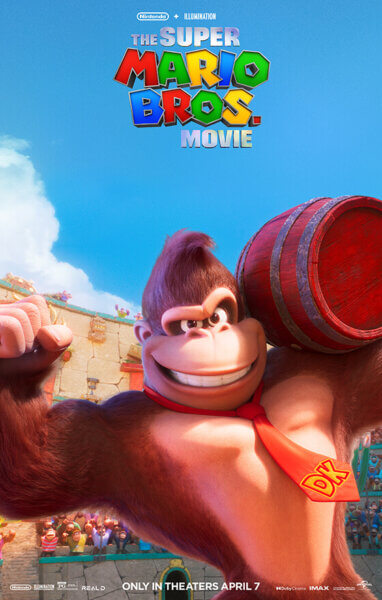The Super Mario Bros. Movie: Can Franchise Storytelling Be Good?
The bubble of big franchise blockbusters has become bloated. Associating a film with the word “Marvel” used to mean a guaranteed billion at the box office, but 2022’s three MCU entries failed to surpass that benchmark. Additionally, films in the Harry Potter and Toy Story franchises underperformed significantly. Studios seem to maintain the attitude that familiar faces will bring an audience, regardless of the story. Exceptions to the rule include Top Gun: Maverick and the sequel to Avatar, films that took time to craft a story, rather than banking on audiences returning because they liked the last one.
Routinely thriving on the familiar is Illumination, a franchise powerhouse. All but one film in the Illumination canon are attached to a well-known IP or are part of their own original franchise. The studio is looking to repeat the trick by optioning one of the biggest franchises on the planet, Super Mario.
Illumination’s track record with existing IP has not been met with critical applause. Adaptations of The Grinch and The Lorax are not the most well regarded titles, either by critics or fans. This leaves Illumination’s Mario movie with a Sunshine-style tightrope to cross. Creating a faithful adaptation will require Illumination to think differently if they wish to avoid cookie-cutter storylines, something general audiences have diminishing appreciation for.
Illumination vs. Nintendo
Illumination’s wounds caused by their films’ mixed critical reception are healed by the mass capital that they generate. Their reputation is built on the back of box office rather than review scores, with just one film under the studio’s banner breaking 80% on Rotten Tomatoes. Illumination mostly targets a younger demographic, knowing children will be transfixed by the deeds of the Minions. This aesthetic is less appealing to the 20-25 year olds who are the majority players of Nintendo games. The simplicity of Illumination’s breakout mascots is what allowed them to become household figures and to gross over $1 Billion in their own film back in 2015.
Illumination’s formula remains strong, even through the uncertainty of the pandemic. They would have little reason to deviate with the Mario movie, were it not for the involvement of Nintendo.
Since some very strange, and weirdly fungal, mishaps in the nineties regarding Mario’s film and TV adaptations, Nintendo have been cautious about how they use the moustachioed plumber. In his mainline games, Nintendo has worked hard to ensure that the name “Mario” is synonymous with quality. It’s worked a treat. Games like Super Mario 64 fundamentally altered the course of gaming history and titles like Paper Mario and the Thousand Year Door and Super Mario Odyssey remain standouts in their respective genres. Nintendo are known for pushing boundaries, and do so through tight control over how their IP is managed.
The philosophies of these two companies conflict so heavily, it’s a miracle that a film was even produced, and it’s anyone’s guess as to its quality. The gold coin-showered lands of Illumination’s box office would have been tempting to Nintendo, but the film’s promotional material gives the impression that they have pushed Illumination past the comforting grassy fields of World 1-1.
Creative Fan-Service
From the clips and trailers released so far, it seems that Nintendo have shown Illumination a new way of capitalising on an existing franchise – respecting the source material. The film looks to be full to the brim with love for Mario and respect for the filmgoing audience.
The Mushroom Kingdom developed by Illumination balances familiarity and creativity perfectly. The character models and environments carry that cosy Mario feeling many will yearn for, but there are world building elements specific to the film which are interpreted in a unique way. Seeing the penguins from Mario 64 be their own tribe of people and seeing coin blocks used as ATMs is compelling as it introduces elements that the audience does not expect.
A rarely-avoided pitfall in franchise storytelling is to plainly present what the audience expects to see. The promise of the Mario movie is not a perfectly traced adaptation, but a creative spin on what fans are used to, a new universe based on something familiar.
The Origin Story
The odyssey into new ground from the Illumination-tinged world of Mario could prove to be insignificant if the story itself follows an overly conventional route. Audiences know when a franchise is being established and see through hollow films that only exist to set up the other films. Origin stories are so difficult to make interesting because studios are averse to taking risks and thus raising the possibility of audiences not connecting to a character.
The trailers depict Mario arriving into the Mushroom Kingdom as a fish out of water who trains to become the hero we know and love. This storyline conjures images of the dozens of conventional origins audiences have been fed in recent years. You never want to watch a movie that feels overly-choreographed. You never want to watch a film where you can predict the ending 30 minutes in. The blockbuster landscape has been dominated by origin stories following the same formula in hopes that this specific IP can be the next Avengers, people are tired of it.
Audiences are also seeing through the tricks deployed by studios to make films more marketable. The inclusion of the cute animal sidekick has plagued animated cinema since the inception of the Minions, with even Disney looking to replicate that success. Characters like Sox in Lightyear, Tuk Tuk from Raya and the Last Dragon and even Olaf from Frozen have always felt like plushies more than characters.
Illumination are well positioned to repeat their trick in the Mario movie, where the Toads are in prime position to become the breakout cute little guys. There is even a line in the trailer alerting you to the fact that the Toads are indeed adorable.
Cynicism about the Mario movie is also derived from the rumours of a Donkey Kong spin-off film. For something like this to pop up before the initial film in the franchise is even released makes audiences feel like they’re on a conveyor belt, waiting for the next IP franchise to be dumped on their heads. The only way to cure such cynicism is through telling a genuinely great story. We can look past the animal sidekicks, the conventional story and the backdoor pilots if you make us love these characters and the journey you take them on.
The Inherent Flaw of the Franchise
The storytelling tug of war between Nintendo and Illumination has the potential to produce something that stands out from the slog of white bread origins the box office has become known for, all while not neglecting the built in fan base which Mario already conducts. Already there is proof of affection for Mario and the desire to innovate on his image, how far they take that desire will be the key factor in how this film is received.
Getting the Mario movie to a place where we don’t feel like we’re being marketed to is a tall, tall mountain to climb. There are unavoidable artistic compromises that have to be made when your movie is meant to sell toys, happy meals and theme park tickets. A movie that desperately needs to make money, that is begging for approval from the widest audiences possible is not a showcase for artistic freedom.
Here, at the start of 2023, we are sliding through the walls of Peach’s Castle, still with an uncertainty of what awaits us at the end. Will it be a shining yellow star, a glimmer of hope for franchise storytelling for years to come? Or will our five-pointed prize be a hollow, blue ghost of a story told by thousands before?



